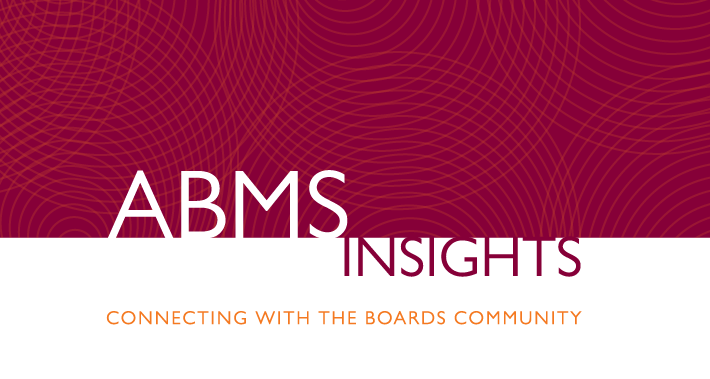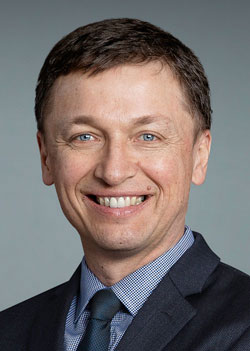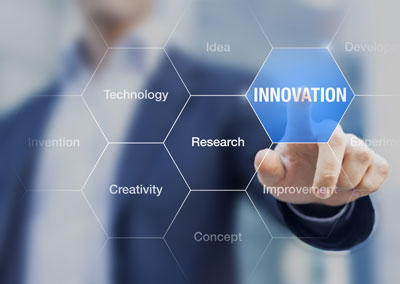
With its broad perspective of expertise across disciplines, the American Board of Medical Specialties (ABMS) is in a unique position to not only promote excellence but to evolve the research surrounding it.

One year after being named Director of the ABMS Research and Education Foundation (REF), Martin V. Pusic, MD, PhD, discusses the priorities for the not-for-profit organization that supports the ABMS mission through a research lens.
The most important priority for REF is to foster independent research about board certification processes, Dr. Pusic said. To that end, the ABMS REF grant program recently announced recipients of its inaugural grants. The purpose of the General Certification grant theme, funded by ABMS, is to explore an array of questions from the influence of artificial intelligence (AI) on certification processes to what professionalism looks like. The Diagnostic Excellence Through Certification theme, which is funded principally by the Gordon and Betty Moore Foundation, will address improving the core medical activity of diagnosis as it touches on initial and continuing certification. “This type of research will encourage ABMS Member Boards to look beyond diagnostic safety toward diagnostic excellence,” Dr. Pusic stated. Insights from the grant projects will inform improvements in the structures, processes, and outcomes of certification.
In the near future, ABMS hopes to partner with external organizations to examine procedural competencies. “The types and quantities of data available hold promise for beneficially informing the certification process, though only if done in a manner that takes into account the full complexity of diplomates’ work,” he said.
In addition to providing leadership and guidance for research programs and initiatives at ABMS, Dr. Pusic is consulting on similar efforts conducted by the 24 ABMS Member Boards. Examining the process of research across the Member Boards is another REF priority. “We want to celebrate the good research methods being used and consider new ones,” he said. For example, there are concerns about how AI can disrupt certification examinations, but AI can also be used as a tool to search the literature, summarize data, and assist in writing research manuscripts, said Dr. Pusic, who in addition to his role at ABMS is an Associate Professor of Pediatrics and Emergency Medicine at Harvard Medical School, and is currently serving as Senior Associate Faculty for Boston Children’s Hospital and Scholar-in-Residence in the Brigham Education Institute at Brigham & Women’s Hospital in Boston. In September, ABMS will host a symposium focused on developing a research agenda for certification processes across the boards.
Dr. Pusic is also committed to working with the ABMS Visiting Scholars on their research projects. He would like the Visiting Scholars to gain a full understanding of the certification process as their projects evolve. “We also want to create a community where an otolaryngologist has an opportunity to engage with a dermatologist and learn where certification issues are similar and where they are different,” he said, adding, “Research is about unusual connections. It’s about gaining insights from other fields that you bring back to your field. That kind of random mixing is a good, productive thing.”
Research and Innovation
In the next five years, Dr. Pusic hopes that the notion of research within the ABMS community evolves. “There is excellent research happening at many of the Member Boards and there has been at ABMS, as well,” he said. “But it’s a time of change and our concepts of research and innovation need to change with it.”

Research refers to an understanding of the core phenomenon. “It is a slower, deeper understanding of concepts, theories, and scientific philosophy,” Dr. Pusic stated. In contrast, innovation focuses on the notion of trying something new, creating prototypes. “Think of an innovation community, such as Silicon Valley, where there is a tremendous amount of creativity going on, and the notion of sustainability and novelty co-exist,” he said. It’s that duality of innovation and research that Dr. Pusic is working toward being embraced by the ABMS community.
As an example, the introduction of digital radiographs is an innovation that has changed how radiographs are being used and the data they offer. “On the research side, we ask questions that extend existing understanding and move it forward,” Dr. Pusic said. “How can a physician use the new three-dimensional reconstructions allowed by digital processes to better diagnose a patient? What makes a physician good at that and what needs to change in how we train? ABMS can similarly look at core processes that span the Member Boards and allow them to push the envelope of how somebody learns and becomes an expert and maintains that expertise,” he explained.
There are differences across the specialties, but there are also similarities. There are certain things that make for a great internist which are different from those things that make for a great surgeon, Dr. Pusic noted. Procedural dexterity is a necessary skill for a great surgeon to master, and yet internists perform numerous procedures. Diagnostic acumen is essential for a great internist, and yet surgeons make many diagnoses. Additionally, the notion of professionalism is similar for both specialties. Member Boards can work together to study the core processes for the commonalities, and then separately identify the specific processes for the specialty. “As a pediatric emergency physician who did research in radiology and dermatologic pathology, I may not know core processes for radiologists or dermatologists, but I can ask questions and wonder why and how they do what they do,” he said. “A beginner’s mind is a good way to stimulate research.”
“Investigating expertise is a very broad field,” Dr. Pusic said. That means ABMS must utilize broad research methods as well as move beyond the boundaries of the current notion of research and innovation.
© 2024, American Board of Medical Specialties.
-
Read More:
- Foundation (REF) |
- ABMS Insights |
- Visiting Scholars |
